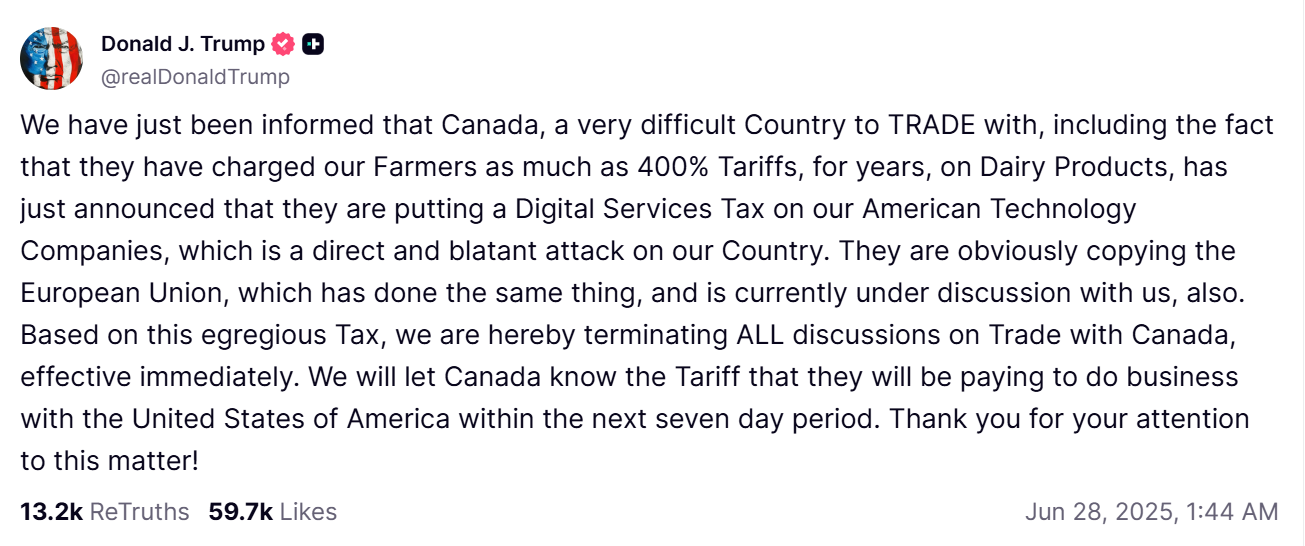Canada pulls DST to revive US talks

Canada has rescinded its controversial digital services tax days before first payments were due, aiming to salvage trade negotiations after US President Donald Trump abruptly terminated discussions and warned of new tariffs within a week.
According to a statement released Sunday by Prime Minister Mark Carney, the move supports “a resumption of negotiations toward the July 21, 2025, timeline” agreed at the G7 summit in Kananaskis.
The tax—passed in 2024 and set to apply retroactively to 2022—would have imposed a 3 percent levy on tech firms with Canadian revenues over $14.7m and global revenues above $820m. The first payments were scheduled for Monday.
Trump’s announcement Friday on Truth Social described the levy as “a direct and blatant attack on our Country” and declared that “ALL discussions on Trade with Canada” were terminated “effective immediately.”

Source: Donald J. Trump @realDonaldTrump via Truth Social
He added that “we will let Canada know the Tariff that they will be paying to do business with the United States of America within the next seven day period,” as reported by multiple outlets including CNN and NBC.
The tax had been expected to impact large American firms such as Amazon, Google, and Meta. Business groups estimate it could have cost US companies as much as $3bn annually, according to CNN.
Canada’s Finance Minister François-Philippe Champagne initially defended the DST as “neutral” and not aimed at any country.
However, he later stated that reversing the tax would “allow the negotiations of a new economic and security relationship with the United States to make vital progress,” reported CNBC.
Trump has consistently objected to digital services taxes throughout global trade talks, referring to them as “non-tariff trade barriers.”
In an interview aired Sunday on Fox News, he said, “Until such time as they drop certain taxes, yeah,” and called Canada “very nasty to deal with.”
Although the two leaders had agreed at the G7 summit to reach a trade and security deal by July 21, the tone shifted after Carney’s government confirmed it would proceed with the DST.
In the Oval Office Friday, Trump said: “We have all the cards. We have every single one… Most of their business is with us, and when you have that circumstance, you treat people better.”
As reported by BNN Bloomberg, Trump’s decision marked a sharp escalation in a trade dispute that began with US tariffs on Canadian goods in February.
Canada retaliated Friday evening with a 50 percent surcharge on certain US steel imports exceeding new quota limits.
Champagne said this was necessary to protect the domestic steel sector from “unjust US tariffs.”
The digital tax, which dates back to Liberal-era policy proposals, had drawn criticism from US lawmakers and lobbyists.
According to Al Jazeera, a June 11 letter from 21 US Congress members called the retroactive nature of the tax “unprecedented” and warned it would “set a terrible precedent.”
Domestically, Canadian business leaders had raised concerns about potential fallout.
Goldy Hyder, CEO of the Business Council of Canada, said to CNN that Ottawa should eliminate the DST “in exchange for an elimination of tariffs from the United States.”
He previously warned that implementing the tax risked undermining Canada’s trade relationship with its top economic partner.
Others, including Unifor National President Lana Payne, criticized Trump’s shifting justifications for trade pressure.
In a social media post, Payne listed past complaints from the US administration—including supply management, autos, and steel—arguing “there is no rational consistent objective other than to break us.”
Supply management resurfaced as a topic during Trump’s Fox News interview, where he reiterated objections to Canada’s agricultural quotas.
However, as per The Globe and Mail, he did not indicate whether addressing supply management was a condition for resuming negotiations.
The policy had passed Parliament with cross-party support shortly before summer recess.
Jean Charest, a member of the Prime Minister’s Council on Canada-US Relations, told The Globe and Mail the council expected this kind of disruption but said Canada should not overreact.
Charest added the DST could be negotiable if the US offers meaningful concessions.
Canada's brief statement Friday reiterated its stance that negotiations would continue “in the best interests of Canadian workers and businesses,” and Carney echoed this to reporters, saying, “We will continue to conduct these complex negotiations in the best interest of Canadians.”



